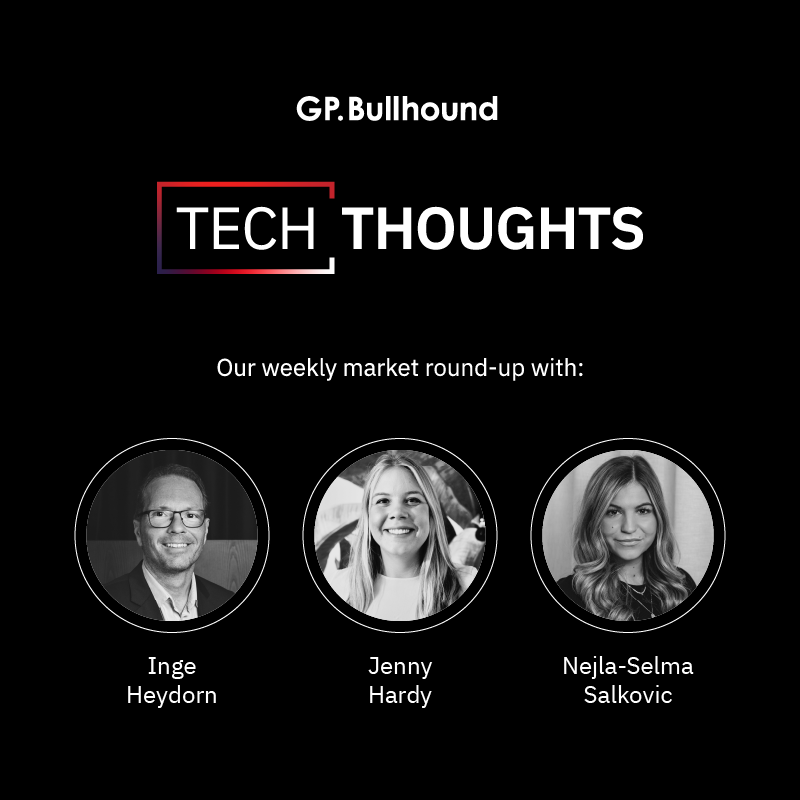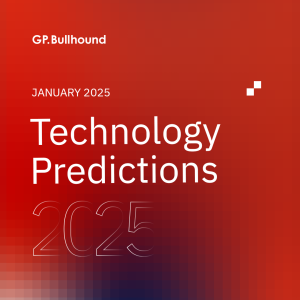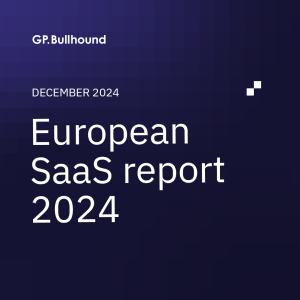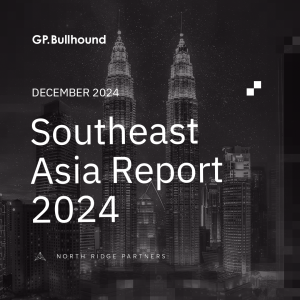Tech Thoughts Newsletter – 16 December 2022.

2022 has certainly been a volatile year in the public markets, with the Nasdaq index down over 30% year to date. And it’s fair to say that the volatility continued with this week’s market moves around inflation and the fed decision – there’s no doubt tech is still fragile.
While the inflation reading was better (lower) than expected, the Fed still struck a fairly hawkish tone around rate rises.
The immediate impact of inflation to tech is in the most part through discount rates and the resulting multiple – the highest valued and most heavily loss-making companies have been hit hardest, we have gladly avoided both.
Inflation’s impact on tech earnings is less straightforward. But we’ve commented before that in many ways tech is a great sector earnings-wise in inflationary environments because it has great pricing power and sticky customer relationships which enables it to pass on its inflationary costs to its customers – we’ve seen lots of examples of that across the board in tech in 2022 – semis have been increasing prices (and will continue to next year); 2022 was the year Microsoft CEO Satya Nadella called software a deflationary force for businesses – in many ways tech is the solution to businesses’ cost issues and so inflation can mean demand for software and services solutions.
Portfolio
We have not made any major changes to our portfolio this week.
Semis – a tail of two end markets – PC/Consumer remains weak, auto still indicating demand and tightness
- Electronics retailer Curry’s this week carried on the slew of bad news we’ve seen related to the PC market (indeed echoing the bad retail sales data coming out of the US this week). That said, weakness is really just more of the same and we’re surely now coming close to a low.
- Staying on PC, Quanta showed some stability in its monthly numbers, Compal was down again month on month (but again, with not much room for it to get a whole lot worse).
- After a weak October, Mediatek (exposed to both smartphone and PC/Chromebook) November numbers released this week showed a month on month increase – again, maybe reflecting some signs of stabilisation (remember we had some signs of smartphone inventories in Asia normalising last quarter).
- On the positive side of semis we still see good signs in the auto semis space, where we see structural growth drivers around the move to electric vehicles.
- Digitimes this week reported continued tightness in NXP’s MCU business.
More restrictions on China semis...
- There was more newsflow around China and US restrictions this week – with 36 Chinese groups now put on the “entity list”. That list effectively makes it much harder to ship to – with licences now required.
- YMTC was the most notable addition to the list, after it supposedly supplied Huawei (violating existing US export controls).
- YMTC is a Chinese NAND manufacturer, and has developed 128 layer NAND technology which is already under restriction. It developed this capacity closely with Apple, who, up until earlier this year (when the US government effectively told them they couldn’t), was going to use YMTC memory in its iPhones (the motivation presumably being lower price – NAND being one of the most expensive components).
- The issue with memory as it relates to China is that particularly Flash is used within AI/machine learning – which is still the main reason the US cites for these restrictions.
- So we already knew that YMTC had been struggling to get tools and wasn’t going to meet its output goals, but we believe that YMTC was (until now) still able to get tools and equipment into its non advanced (sub 128 layer) facilities. The new restrictions likely make that much harder – even getting spare parts, receiving software updates will likely require licenses.
- It’s a significant move – now not only stopping YMTC advancing its technology, but also making it much harder for them to continue their existing businesses.
- There was also the first indication we’ve had that China won’t be able to get ARM licenses – ARM’s latest Neoverse V series’ performance is too high meaning it falls in the advanced restrictions, and it’s been reported that Alibaba has been unable to buy the designs.
- These restrictions will clearly hurt China – who had grown a fairly successful and significant fabless design industry, and was starting to develop competitive solutions. In addition, their own fabless industry was one of the ways they could try to navigate the current restrictions in advanced technologies (for instance in coming up with alternatives to Nvidia datacentre/AI chips).
- There was also discussion this week around a semiconductor stimulus package coming in China boosting domestic production of 1 trillion yuan (over $140bn).
- These all sound like big numbers, but – a bit like the $40bn announced by TSMC in Arizona, in the context of semis and how far China is behind in manufacturing technology, it pales a bit.
- There’s also the problem of what they spend on – the reality is that they can’t buy the advanced tools from the US, it’s not clear that they will be able to buy them from Japan and Nethlerlands either, and their own semicap equipment industry is in the still very very early stages.
Gaming – strong titles driving demand in hardware, mobile still under pressure
- November numbers in the U.S showed overall gaming spending is still down slightly (3%) compared with 2021. We did however see strong hardware performance in the month of November (45% increase vs. year ago to $1.3 billion) due primarily to a significant increase in PlayStation 5 volume when compared to a year ago.
- The increase in hardware sales is likely driven in part by holiday sales. We can also see that the best-selling video game of the month was Call of Duty: Modern Warfare II which was followed by God of War Ragnarok.
- Moreover, God of War Ragnarök instead took the first place on the Europe charts for November 2022. November numbers across Europe decreased by 17 percent year-on-year.
- The mobile gaming market continues to be under pressure in November with Y/Y decline in aggregated sales. Roblox (not owned) released disappointing booking numbers for November falling 4% mth/mth to $224m pressured by a weak market and the strong USD. The number was clearly below expectations and management comments in October stating that November should be up on October. Daily active user was also weaker at 56.7m up 15% yr/yr with a lower booking number per user.
Hardware – telecom equipment still a tough market
- Ericsson (not owned) hosted its capital markets day yesterday and the company has clearly turned more cautious towards the investment environment around mobile networks. The company is keeping its margin guidance but highlighted that it expects to land in the lower end and that further cost cuts are needed to reach it. We believe the company is continuing to gain market share but the mix effect away from the US will put pressure on margins.
- We also believe that the company will have a major challenge now to integrate Vonage, Ericsson history in corporate business is not strong.
Software – still solid results and a focus on cash flows
- Oracle (not owned) reported a strong Q2 – above their own guidance and market consensus, and Q3 was guided better than expected too.
- Sales were driven especially by cloud services and license support sales.
- Shares were up initially but then fell back on weak NASDAQ performance but also on the worries around cash flow generation.
- From our perspective, the company is far behind the big 3 hyperscalers (Microsoft, Amazon and Google) in cloud and will have to continue to spend in order to compete.
- The company spent $2.4bn during the quarter and expect that level to continue going forward.
- The negative for Oracle: very limited cash flow growth (perhaps even a cash flow decline) in the coming years.
- The positive for us: hyperscaler capex continues – that’s helpful for the semis ecosystem, semicap equipment and we think represents a multi year trend as hyperscalers continue to spend to keep up with the best performance.
- Adobe (owned) reported Q4 broadly inline with expectations on the top line (up 14% yr/yr) but with a slightly better margin and EPS. Cash flow impressed totalling $2.3bn in the quarter. Digital Media hit a record level on net ARR at $576m and Digital Experience reached $1bn in subscription sales up 16% yr/yr. The company maintained their guidance for 2023 (though no surprise there as it was only released back in October at their capital markets day).
- Our conclusion – the numbers are good enough given the market environment and the pressure that has been on the shares since they announced the Figma deal. Historically Adobe has handled downturns in the economic environment reasonably well – the call definitely spoke to the secular trend towards digital continuing in spite of a more uncertain macro – and we expect roughly the same outcome this time around. Importantly, the company is also very profitable and generates a very good cashflow.
- Accenture also reported today – overall robust results, above where they guided the quarter, with 15% cc yr/yr growth and they’re reiterating their 2023 guidance, showing still strong demand for digital transformation. Europe and the resources sector were especially strong.
For weekly insights on the latest market updates, please subscribe to our Tech Thoughts podcast.
For more information about Tech Thoughts, please visit https://www.gpbullhound.com/tech-thoughts/.
We provide investors with access to category leading technology companies, globally. Our assets under management have a total value of more than €1bn, and our limited partners include institutions, family offices and entrepreneurs. Learn more about our funds here.
Enquiries
For enquiries, please contact:
Inge Heydorn, Partner, at inge.heydorn@gpbullhound.com
Jenny Hardy, Portfolio Manager, at jenny.hardy@gpbullhound.com
Nejla-Selma Salkovic, Analyst, at nejla-selma.salkovic@gpbullhound.com
About GP Bullhound
GP Bullhound is a leading technology advisory and investment firm, providing transaction advice and capital to the world’s best entrepreneurs and founders. Founded in 1999 in London and Menlo Park, the firm today has 12 offices spanning Europe, the US and Asia. For more information, please visit www.gpbullhound.com.



